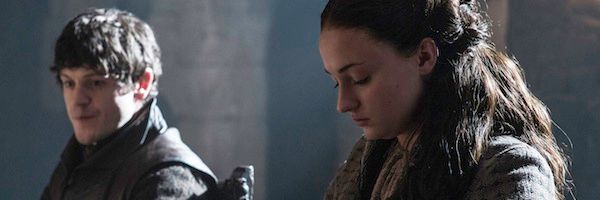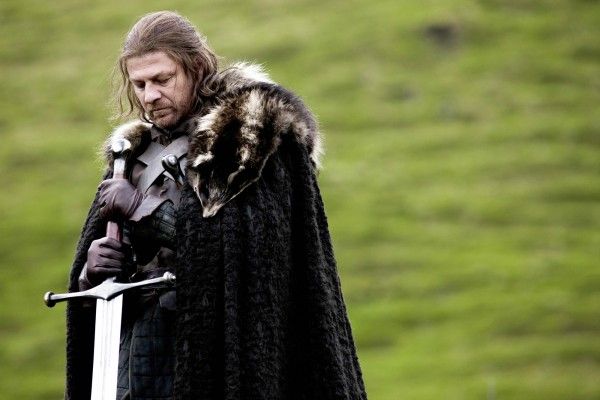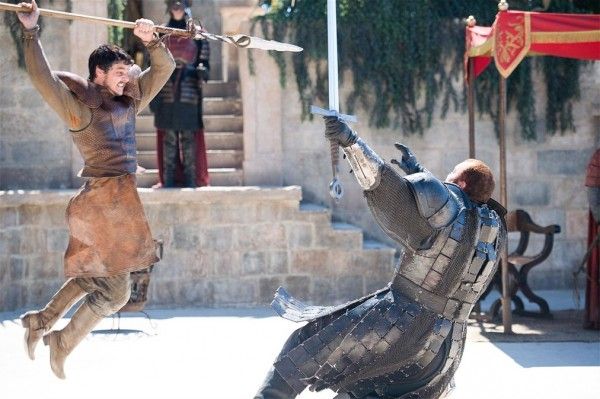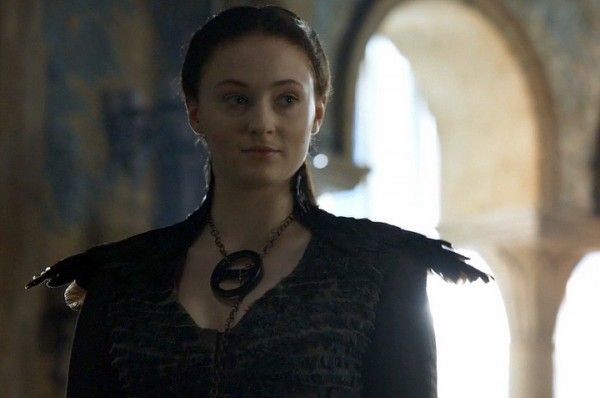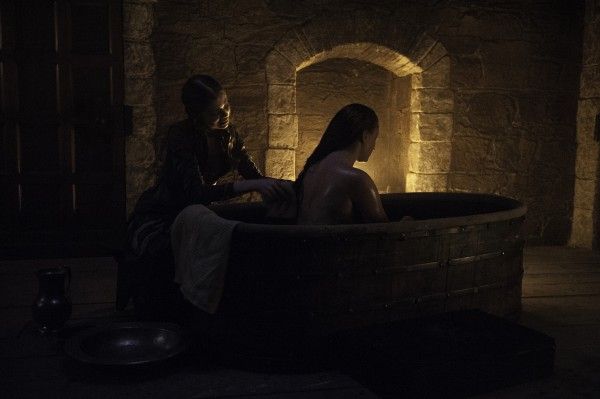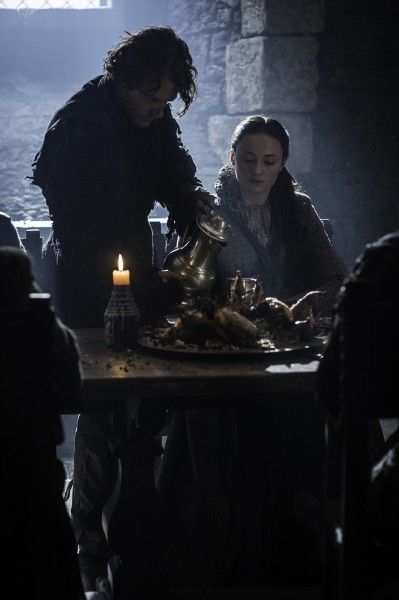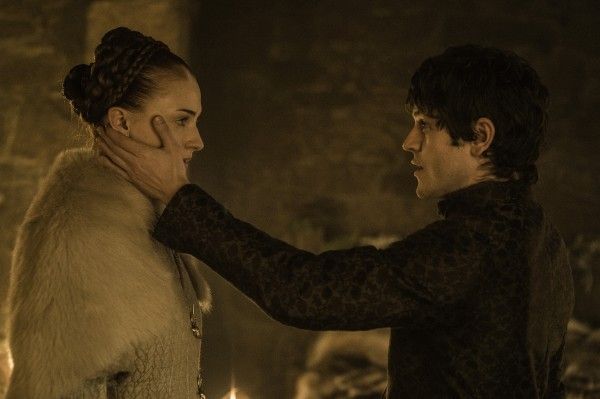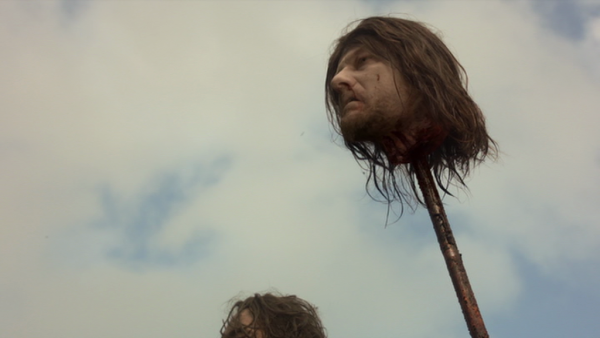[This article contains spoilers for the TV series up to the latest episode; it does not contain spoilers for the books because I have never read the books]
On this past Sunday’s episode of Game of Thrones, “Unbowed, Unbent, Unbroken,” Ramsay Snow raped his new bride Sansa Stark and forced Theon Greyjoy (essentially her brother) to watch. This scene has sparked understandable outrage from viewers and responses from the creators (you can also click here for what author George R.R. Martin and star Sophie Turner had to say).
However, I believe this scene, taken on its own merits and how it relates to the history of the show, is the natural progression of a storyline and characters we already accepted. Furthermore, anger at this event has partially arisen from a faulty appraisal of Sansa’s character development. Outrage should be reserved not for an unsurprising scene, but be dependent on an outcome that’s currently unbeknownst to viewers beyond the consistent tone of the series.
Game of Thrones is not a nice show. It’s a popular show, and it has just enough positive moments and fascinating plot developments to keep stringing us along, but overall it’s a pretty nasty piece of work, and has been since the very first episode.
The first season tells us everything we need to know about the show’s morals and approach to the world. In the very first episode, we see that even nobility is complicated with Ned Stark following through on his belief that “The man who passes the sentence should swing the sword.” It’s a position of self-accountability, but that accountability involves capital punishment.
However, the episode ends with Jaime Lannister pushing Bran out of a window after he witnessed incest. Ned Stark provides the stoic leadership we can respect; the Lannisters display the selfishness, duplicity, and twisted behavior that had us hooked. Be honest, which ending is more compelling: Ned being forced to execute a deserter or a kid getting pushed out of a window?
The conclusion of Season One confirms that being “good” in Game of Thrones is meaningless. It’s far more important to be cunning, strong, and ruthless. That’s where true power lies, and that’s why the Red Wedding is such a gut-punch. Robb Stark, who led a noble cause to avenge his father’s death and free the North, was betrayed and murdered along with his mother and pregnant wife. The show is filled with ugliness and unfairness, but we’ve kept coming back for more.
So can we really be shocked that Sansa Stark was raped at the end of the most recent episode, “Unbowed, Unbent, Unbroken”?
Part of Game of Thrones’ success comes from how it upends fantasy tropes and spits in the face of nobility. People do manage altruistic things from time to time (Jaime trying to protect Brienne) and occasionally the good guys win (Tyrion leading the victory at Blackwater), but this is a show that’s constantly rebelling against what we want to happen.
Last year’s episode, “The Mountain and the Viper,” was a prime example of backhanding our desired outcome. The battle between Oberyn and Ser Gregor "The Mountain" Clegane is clearly based off the fight between Inigo Montoya and Count Rugen, where the hero keeps taunting the villain with the same phrase. Except in Game of Thrones, this demand for justice ends up with Oberyn getting his head popped like a casaba melon. It’s gruesome, ugly, and disheartening.
And that’s the life of Sansa Stark. I’ve read in other editorials that Sansa is a “beloved character,” which is an odd description for someone who has rarely shown agency in her own life. Cruel and powerful men have mistreated Sansa, but that doesn’t make her likable. Sansa Stark is innocent, and we want to protect her innocence because she’s a victim of circumstance. No one on Game of Thrones has had worse treatment for a longer period of time.
Her defining characteristic is that she’s a victim, and we thought we had turned a corner in “The Mountain and the Viper” when she finally manages to hoodwink an authoritative body, and sides with the cunning Petyr Baelish. She then changes her appearance by dying her hair black, putting on a killer dress, and walking down the steps with a self-assured air we had never seen on her before. This was a Sansa who finally learned how to play the game.
Except every episode so far has shown her to be out of her league, and still functioning as a pawn. Petyr is not her ally or her equal. He’s the one making all the moves and she’s the pawn. He knows just which buttons to push and makes her believe that she can avenge her family. She’s still being manipulated; the only difference is that as opposed to King’s Landing where people made her feel small, she’s now being built up despite being out of her depth.
And Sansa knows she’s out of her depth when she’s sent to marry Ramsay Snow. She’s had a brief apprenticeship with Petyr, and now she’s supposed to manipulate powerful men to meet her goal. But it’s okay because her hair color is different and she changed her clothes.
The key scene in “Unbowed, Unbent, Unbroken” is Sansa’s bath and conversation with Myranda because it dupes us into thinking Sansa has really changed when in reality she lacks the fortitude and the skill to break free of her identity of victimization. Sansa doesn’t deserve what happens to her, but Game of Thrones couldn’t give less of a shit about what people deserve. The reality of Sansa’s life is that she is the beleaguered woman of Westeros. Giving Myranda a firm talking to isn’t a show of power because Myranda is a servant. There’s nothing she can do. The revelation of the scene is Sansa losing her black hair. That strength was washed away as easily as hair dye.
That’s how Game of Thrones works and why it continues to hold power over us. The show keeps playing off our desires to see something good and then making us question if that can ever happen. The execution of Ned Stark is the show’s true beginning because it tells us that anything goes, and so we’re largely left with uncertainty. It’s better to expect that everything will be terrible and cherish the brief victories (Remember: No matter how bad things get, Joffrey is still dead).
Sansa’s rape at the end of “Unbowed, Unbent, Unbroken” should not be a surprise to anyone who has watched Game of Thrones for the last five years. You’ve put an innocent young woman into an arranged marriage with a sadist who keeps her de facto brother as a pet. This situation was inevitable, and it loomed over the plot from the moment Sansa learned she’d be forced to marry Ramsay.
Anything outside of what happened would be betraying the characters. Sansa has been programmed to never fight back; Ramsay is a monster; and Theon has been cowed into submission. This situation couldn’t unfold any other way without betraying the characters. Would Sansa outwit Ramsay? Would Ramsay show pity? Would Theon refuse his master? It would be nice if any of these things happened. It would also be narratively dishonest. You may as well have Hodor ride in on a dragon to rescue Sansa (although I admit that would be amazing).
The scene unfolded as it did because it’s the natural progression of the characters and their situation as the show’s personality demands, not as the fans would wish. It would be nice if someone came to save the day or someone rebelled against their circumstances, but we’ve established that Game of Thrones is not, nor has it ever been, that kind of series.
To be perfectly honest, I didn’t have a problem with the episode showing the rape because that’s what I’ve come to expect from Game of Thrones, and I understand that other viewers are worn out from the show’s—and to a larger extent, the media’s—treatment of rape. But within the context of Game of Thrones, and especially this episode, the disgusting rape, fits the scenario.
The problem comes with the execution and whether or not it should have been shown. Did we need to see Sansa’s clothes ripped off and a tear-filled Theon forced to watch while she cried out in pain? Couldn’t director Jeremy Podeswa simply backed away, closed the door, and spared us from the gruesome details?
Of course. Writer Bryan Cogman could have also avoided writing the scene altogether. It’s fiction and anything is possible (cue: Hodor + Dragon). But stories only have power if they’re honest to themselves. Game of Thrones may have exhausted its viewers’ patience, but that’s based on how much the viewer can withstand, not a shift in the show’s behavior. The characters may change (most don’t) and the plotlines differ, but the character of the show has remained constant.
Sansa’s rape scene, stomach churning as it was, wasn’t played for shock value. It didn’t come out of nowhere. It’s the evolution of the story, and I understand if some people are sick of that story. But it’s not an incident that existed in a vacuum or some despicable outlier. It’s not gratuitous if that’s the expected outcome of a series’ tone, plotline, and character behavior. It’s upsetting and it’s supposed to be upsetting. That’s what this show has always done.
Some will argue that the repercussions of the rape will be truly maddening even though we don’t know what future episodes hold. If we can be outraged about episodes we haven’t seen, then we may as well have been outraged before this one even aired. I don’t know how the story is going to go, and I don’t know how Sansa’s rape will change the characters or affect the plotline. Rape should never be treated lightly, and within the context of this one scene (the only thing we know for certain because everything after is speculation) it’s absolutely horrific, and it should be.
So the question isn’t “Why did they even bother to include the rape?” It has nothing to do with “necessity” but the natural, inevitable, and upsetting trajectory of this show, and especially Sansa’s storyline. Game of Thrones may upend traditional fantasy tropes, but it’s stuck to it plan of crushing viewers’ hopes, which includes the hope that Sansa had somehow grown based on her mostly superficial changers.
Game of Thrones played fair with audiences. Those who were upset with the ending of “Unbowed, Unbent, Unbroken” should remember that the show never plays nice.

